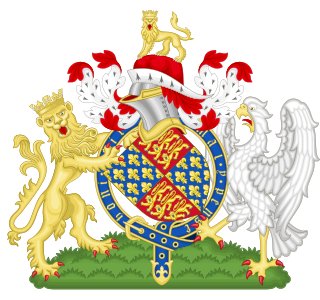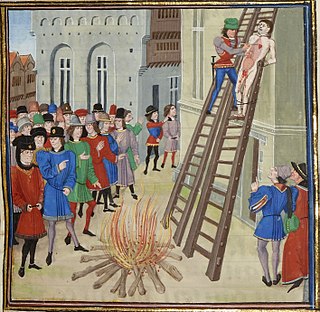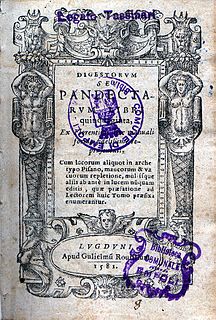
Article Three of the United States Constitution establishes the judicial branch of the federal government. Under Article Three, the judicial branch consists of the Supreme Court of the United States, as well as lower courts created by Congress. Article Three empowers the courts to handle cases or controversies arising under federal law, as well as other enumerated areas. Article Three also defines treason.

The History of The Lord of the Rings is a four-volume work by Christopher Tolkien published between 1988 and 1992 that documents the process of J. R. R. Tolkien's writing of The Lord of the Rings. The History is also numbered as volumes six to nine of The History of Middle-earth. Some information concerning the appendices and a soon-abandoned sequel to the novel can also be found in volume twelve, The Peoples of Middle-earth.

Proscription is, in current usage, a "decree of condemnation to death or banishment" and can be used in a political context to refer to state-approved murder or banishment. The term originated in Ancient Rome, where it included public identification and official condemnation of declared enemies of the state. It has been used broadly since to describe similar governmental and political actions, with varying degrees of nuance, including the en masse suppression of ideologies and elimination of political rivals or personal enemies. In addition to its recurrences during the various phases of the Roman Republic, it has become a standard term to label:

Under the law of the United Kingdom, high treason is the crime of disloyalty to the Crown. Offences constituting high treason include plotting the murder of the sovereign; committing adultery with the sovereign's consort, with the sovereign's eldest unmarried daughter, or with the wife of the heir to the throne; levying war against the sovereign and adhering to the sovereign's enemies, giving them aid or comfort; and attempting to undermine the lawfully established line of succession. Several other crimes have historically been categorised as high treason, including counterfeiting money and being a Catholic priest.
Petty treason or petit treason was an offence under the common law of England which involved the betrayal of a superior by a subordinate. It differed from the better-known high treason in that high treason can only be committed against the Sovereign. In England and Wales, petty treason ceased to be a distinct offence from murder by virtue of the Offences against the Person Act 1828. It was abolished in Ireland in 1829. It never existed in Scotland. It has also been abolished in other common-law countries.
The Treason Trial was a trial in Johannesburg in which 156 people, including Nelson Mandela, were arrested in a raid and accused of treason in South Africa in 1956.

The Treachery Act 1940 was an Act of the Parliament of the United Kingdom enacted during World War II to facilitate the prosecution and execution of enemy spies, and suspended after the war and later repealed. The law was passed in the month after Nazi Germany invaded France and Winston Churchill became prime minister.
Misprision of treason is an offence found in many common law jurisdictions around the world, having been inherited from English law. It is committed by someone who knows a treason is being or is about to be committed but does not report it to a proper authority.

The Treason Act 1351 is an Act of the Parliament of England which codified and curtailed the common law offence of treason. No new offences were created by the statute. It is one of the earliest English statutes still in force, although it has been very significantly amended. It was extended to Ireland in 1495 and to Scotland in 1708. The Act was passed at Westminster in the Hilary term of 1351, in the 25th year of the reign of Edward III and was entitled "A Declaration which Offences shall be adjudged Treason". It was passed to clarify precisely what was treason, as the definition under common law had been expanded rapidly by the courts until its scope was controversially wide. The Act was last used to prosecute William Joyce in 1945 for collaborating with Germany in World War II.
The High Treason Incident, also known as the Kōtoku Incident, was a socialist-anarchist plot to assassinate the Japanese Emperor Meiji in 1910, leading to a mass arrest of leftists, and the execution of 12 alleged conspirators in 1911.

The Treason Felony Act 1848 is an Act of the Parliament of the United Kingdom of Great Britain and Ireland. Parts of the Act are still in force. It is a law which protects the Queen and the Crown.

The Treason Act 1695 is an Act of the Parliament of England which laid down rules of evidence and procedure in high treason trials. It was passed by the English Parliament but was extended to cover Scotland in 1708 and Ireland in 1821. Some of it is still in force today.

"Reason Is Treason" is the second single release from British rock band Kasabian. As a limited release it was ineligible for chart entry.

High Treason is a 1929 film based on a play by Noel Pemberton Billing. It was directed by Maurice Elvey, and stars James Carew, Humberstone Wright, Benita Hume, Henry Vibart, Hayford Hobbs, Irene Rooke, and Jameson Thomas. Raymond Massey makes his first screen appearance in a small role. The sound film was presented in a London trade show on 9 August 1929, then went into UK general release in silent and sound versions on 9 September 1929. The sound version was released in the US by Tiffany Productions on 13 March 1930. The silent version and a trailer for the sound version are preserved and held by the British Film Institute; the only known surviving original copy of the sound version is a lavender fine grain of the American release version held in the collection of Alaska Moving Image Preservation Association (AMIPA), which has been recently restored by the Library of Congress.

The Succession to the Crown Act 1707 is an Act of Parliament of the Parliament of Great Britain. It is still partly in force in Great Britain.

To be hanged, drawn and quartered was from 1352 a statutory penalty in England for men convicted of high treason, although the ritual was first recorded during the reign of King Henry III (1216–1272). A convicted traitor was fastened to a hurdle, or wooden panel, and drawn by horse to the place of execution, where he was then hanged, emasculated, disembowelled, beheaded, and quartered. The traitor's remains were often displayed in prominent places across the country, such as London Bridge. For reasons of public decency, women convicted of high treason were instead burned at the stake.
The Jurors (Scotland) Act 1745 was an Act of the Parliament of Great Britain, passed during the Jacobite Rising of 1745. Its long title was "An act for the more easy and speedy trial of such persons as have levied, or shall levy war against his Majesty; and for the better ascertaining the qualifications of jurors in trials for high treason or misprision of treason, in that part of Great Britain called Scotland." It was one of the Juries (Scotland) Acts 1745 to 1869.
The Congress Alliance was an anti-apartheid political coalition formed in South Africa in the 1950s. Led by the African National Congress, the CA was multi-racial in makeup and committed to the principle of majority rule.













